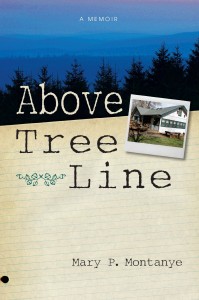
by Jenna | Mar 21, 2017 | Guest Posts
And we're back! It's time for the next installment of our "Author Insights" series. In this series, I'm introducing you to writers who've taken their writing all the way to the finish line of publication, and they share their "lessons learned" with you. There's nothing quite like learning from a writer who has made to the other side.
Plus, if you leave a comment at the end of the post before Friday, March 24th at 5 p.m. Pacific Time, you'll be entered to win an autographed copy of the author's book in a random drawing. (IMPORTANT: You must be located in the United States to win.)
Meet Mary Montanye, author of Above Tree Line
I'm thrilled to introduce you to Mary Montanye. Mary joined my writing community at the beginning of 2013 in order to finish the memoir she'd been working on for five years before she joined us. She's now tackling her next big writing dream with the help of the writing community: Writing a romantic suspense novel. Mary quickly became a staunch advocate for the approach we use in the writing community and joined the team as a coach after participating as a member of the writing community for about a year and a half.
I asked Mary to share her insights about writing her memoir with us.

Mary Montanye on 5 Lessons Learned in Writing Above Tree Line

My memoir, Above Tree Line, took seven years to write and publish. During that time, I made a lot of mistakes. Here's what I learned and how I’d do it differently now.
1. Find support early in the process, but don’t let that support stop you from completing the project so you can move on to others.
I worked with a brilliant writer and teacher for much of the writing of Above Tree Line. I learned a great deal from her and will always be grateful for the time I spent as her student. But eventually I realized that somewhere in my work with her I’d become stuck. We were spending all our time together going over and over the same material — changing, tweaking, finessing. I began to wonder if my resistance to publishing and her desire to keep me as a student, might be getting in the way. I ended our working relationship and joined Jenna's writing community instead. I completed my memoir within a couple of sessions and moved into the publishing stage.
2. Don’t start at the beginning when writing a memoir. (This might be true for other types of writing as well. I’ll let you know when I finish the novel!)
Start anywhere you feel the heat — a memory, a taste, a color, an image, a sensation, a fragrance. Write from there. “She was born on August 16th at such and such hospital in Honolulu, Hawaii…” will bore you and make it more difficult to continue. Your reader won’t like it either. So why bother?
Let the first draft be all over the place. Let it be messy, filled with what was powerful and exciting for you. Ask yourself what interests you about your history or your family. Put it all in, even those parts you know you’ll never let stand. This draft is not the time to censor yourself. If you worry about what your readers will think, you might find you’ve left the gold in the ground and can’t remember where it was when you want to dig it up later.
3. Recognize fear and resistance for what it is — just fear and resistance. It doesn’t mean that you’re not a writer or that it is time to quit.
Fear and resistance got the best of me during the writing stage because I was not separating the creating of a project from the publishing or marketing of it. If I was in the middle of writing about a painful period of my childhood, for instance, and suddenly flashed on the idea that someday someone, perhaps even someone I knew and loved, would be reading it, I froze. I also stopped myself from writing when I’d compare my writing to that of others or when I read posts about the impossibility of publishing in the current marketplace. My coach and fellow writers in the writing community gently guided me back to what was in my power to do: write. Write the best story I could write now, they urged, and leave the rest for later.
4. When you share your writing other than with friends and family, it’s a pretty safe bet that someone won’t like it, that you will get rejections or negative reviews.
I was devastated when a woman who reviewed my memoir for a contest said that, even though the writing was good, she didn’t like either me or my husband. She was a stranger and still it hurt that she didn’t like me and that I’d portrayed my husband as unlikeable as well, at least in her eyes. I made this one review more important than it was — even more important than the complimentary reviews I’d received. A negative review almost stopped me from ever sharing my writing with anyone again.
The lesson in this for me, and I hope for you, is that if you write honestly, if you allow yourself to be vulnerable on the page, you will affect people. And that’s what we want, right? It’s okay if some of our readers don’t approve, like the writing, or even us. Feel your feelings about the review. The writing community and my coach helped me with this, too. They shared my pain and helped me to put it aside, to continue on.
5. Keep at it. If you have a desire to write, you are meant to write. Jenna would say you have a calling, and we both believe that callings are meant to be followed.
When I held my published memoir in my hands, felt the weight of it, and flipped through its pages, it was one of the greatest days of my life. I was so proud. I wish you the same experience. No matter where you are in your writing, no matter how unsure you may feel, keep going. Get help if you need it, but whatever you do, don’t give up. It is so worth it!
About Above Tree Line
 From Amazon.com: "The traumas and losses of childhood are often buried. The child grows up appearing normal, unscathed and perhaps even successful. But often what is buried comes back to attack at the very moment when life is reaching its pinnacle. This is the story of one woman’s spiral downward into physical and mental breakdown and her return to wholeness by courageously, and some would say recklessly, following her intuition. Ms. Montanye’s intuition leads her to a tiny town in a Colorado canyon alongside the wild and scenic Cache La Poudre River. There, she immerses herself in the grandeur and beauty of the surrounding mountains. When her journey begins, no one involved can know that it will lead to such a powerful and bittersweet end: an end that includes healing for herself, her marriage and for the difficult relationship she endured with her mother."
From Amazon.com: "The traumas and losses of childhood are often buried. The child grows up appearing normal, unscathed and perhaps even successful. But often what is buried comes back to attack at the very moment when life is reaching its pinnacle. This is the story of one woman’s spiral downward into physical and mental breakdown and her return to wholeness by courageously, and some would say recklessly, following her intuition. Ms. Montanye’s intuition leads her to a tiny town in a Colorado canyon alongside the wild and scenic Cache La Poudre River. There, she immerses herself in the grandeur and beauty of the surrounding mountains. When her journey begins, no one involved can know that it will lead to such a powerful and bittersweet end: an end that includes healing for herself, her marriage and for the difficult relationship she endured with her mother."
Above Tree Line is available on:
About Mary
 Mary Montanye lives on the central Oregon Coast where she gratefully writes and coaches while often resting her eyes on the beauty of the natural world that surrounds them. Mary has a master's degree in clinical social work from the University of Iowa and counseled individuals and families through nonprofit agencies and her own private practice for many years before retiring and following her dream to write.
Mary Montanye lives on the central Oregon Coast where she gratefully writes and coaches while often resting her eyes on the beauty of the natural world that surrounds them. Mary has a master's degree in clinical social work from the University of Iowa and counseled individuals and families through nonprofit agencies and her own private practice for many years before retiring and following her dream to write.
You can find Mary online at www.marymontanye.com.

by Jenna | Nov 10, 2016 | Writing Articles
It's been an intense week.
Regardless of your political affiliation, here in the U.S. and worldwide we've been through the wringer and come out changed. We're all going through a lot right now. There's much to process, contemplate, and recover from.
In the midst of all this, the important thing is to remember who we are. That we each have a purpose to fulfill.
A calling.
If you're hanging out with me in this little corner of the Universe, you're called to write. To create with words, pen on page, fingers on keyboard.
A tremendous gift, writing is.
It has the power to open minds and hearts.
To express deeper truths.
To shine lights into the recesses of our humanity and unearth hidden gems and wounds.
To heal, inspire, strengthen, catalyze, and change.
To heal us individually as writers.
And even though it may be tempting to turn away from your writing right now, please don't.
If not for others, for yourself. Because writing will remind you who you are, and what you were put here to do.
When my mother in law died in 2015, I clung to my writing as if it would save my life. It was my constant in a sea of pain and turmoil.
If you find yourself in that place now, as I do, let writing be the raft that carries you to shore.
I know that not everyone is hurting right now. It is likely that some among us are happy with this week's outcomes. And that is your right.
But let us keep the focus on the larger vision. Our writing. Our truths. The messages we each have to share with the world. Because that's why we're here.
Keep writing.
With love,


by Jenna | Dec 22, 2015 | Writing Articles
I waited for years to start writing fiction.
Inside, I felt like I had to get some kind of stamp of approval before I was "allowed" to write. That I needed an expert or agent or mentor or master writer to see my potential and encourage me to pursue writing. That otherwise I was chasing a fool's dream or breaking the rules somehow.
Change Your Mindset
I think many writers or want-to-be-writers do this. It's tied to perfectionism. A belief that we have to be "good enough" before we start. That there's a qualification level we have to reach before we even begin.
But how can we learn how to do anything, until we actually start doing it?
One of my mentors, Hal Croasmun of ScreenwritingU.com, talks about how he makes a point, every two years, to learn a new skill, so that he always remembers what it's like to be a beginner. This helps him develop the programs he runs for new writers because he can put himself in our shoes. I'm willing to bet he doesn't wait for permission to learn karate or poker or horseback riding. I'm betting he picks something that interests him, and goes for it.
Why can't we do the same with writing?
Perfectionism, again. This has to do, in part, with the black and white nature of writing in this digital age. Back when I wrote drafts on paper, I didn't hesitate to scratch things out. I knew I was writing a first draft. (I can even recall telling my father that I didn't think I could ever write without real paper! How times have changed...) There's something about seeing our words looking so final that makes them seem like they should be final draft, publication quality. Which is entirely unfair to our early stream-of-consciousness drafts.
Underneath the perfectionism is also fear, the lurking originator of perfectionism and other writerly issues, which tells us to play it safe and protect ourselves from potential failure, ridicule, and rejection. It's a powerful force that works against us and our writing.
But again, how can we learn, grow, and develop ourselves as writers without actually doing the work?
We cannot.
We have to change our mindsets from a fixed mindset to a growth mindset.
And we have to stop waiting for permission -- for some kind of pre-approval that will guarantee our success -- otherwise, we are really just kidding ourselves.
Don't Wait for Permission
Here's the thing.
You do not have to wait for ANYONE to validate you or tell you that you are good enough or deserving enough or talented enough to write.
No one has to “see” or recognize your writing as “good enough” before you can write. There’s no outside evaluation or assessment of “potential” needed or required.
YOU ARE A WRITER.
You are a writer because you are CALLED TO WRITE.
You know you are called to write because you have been persistently nudged, cajoled, and pestered by your deeper, higher, wiser self to write.
That means, by definition, you have been invited by the Universe to write.
And therefore, you have all the permission you need, right now.

by Jenna | Dec 10, 2015 | Writing Articles
I believe in callings.
I believe that each of us has something that we were put here to do, and when we find what it is, we must do it with all our hearts.
And... it isn't always easy to get clear on what our calling is.
Why?
The noisy, busy world we live in and the noisy, busy minds we are encouraged to cultivate by the mainstream makes it hard to hear ourselves and the deeper whispers of our souls.
And that's often how a calling comes through, as a whisper.
It took me a number of years to come around to realizing that my deepest call is to write. I spent my 20s and 30s sorting myself out in that regard, changing careers, soul-searching, and more (like helping other people get clear on their life callings!), only to come back to the insight that my 6th grade self already had hit upon: I want to write.
Are you called to write?
If you're here, reading a website named "Called to Write", I'm going to assume that you also feel that call. That you have the inner compunction to put words to the page in some form. You may or may not be doing it yet, or maybe not yet quite the way you want to be doing it, but I'm guessing that one way or the other, you've been feeling the call to write for some time.
When I conducted a survey a little while ago, 71% of you said that you felt called to write without a doubt. That's huge. And fantastic!
And, interestingly, 71% of you also said that you struggle with procrastination.
Isn't that fascinating?
The very thing we feel called to do is the very thing we tend to avoid.
And it's entirely normal.
One of my favorite things Steven Pressfield says in The War of Art (aka "Jenna's Bible") is this:
"The more important a call or action is to our soul's evolution, the more Resistance we will feel toward pursuing it."
In other words?
The bigger the dream, the more we fear and avoid it.

by Jenna | Mar 6, 2013 | Writing Articles
I spoke with a sister writer yesterday and we talked about the many, many challenges we face when it comes to completing projects, let alone getting them out there into the world.
As moms and working women, we said, there’s always so much that has to be done, so many dishes to wash, noses to wipe, and deadlines to meet. Then if you start factoring in other people’s needs and wants (especially when you put them first) it’s all too easy to let your precious soul’s work slip to the bottom of the pile.
I’ll get to it later
If you’re like most people, you’re probably going through the day thinking that you’ll get to it later — whatever your “it” is, that creative work you’re endlessly postponing for another day, whether it’s writing or painting or drawing or finally getting the word out about your work — but that later never comes.
Or maybe you’ve promised yourself that you’ll work at the end of the day, but quite frankly, you’re exhausted.
The trap
The trap is that you’re aiming to clear the decks first, thinking your brain will finally have the space it needs for the creative work.
You figure you’ve got to get to Inbox Zero or handle all those administrative tasks or answer so-and-so’s Very Important Message first. Then you’ll be able to focus.
But.
Those things are like tribbles from Star Trek. They multiply at an exponential rate of growth, and if you persist in putting them first? They will literally devour your time.
And right now, you are letting them do that.
It’s time to stop.
How?
Let’s face it. Life happens. Life can be busy. It doesn’t have to be, but it often is, in this culture, in this era.
There will always be more email.
There will always be more to do. More information. “Opportunities.”
And we get to choose how we respond to that stuff, or not.
Do you want to organize your life around it?
Or do you want to organize your life around what is most sacred to you?
Your deepest, soul-level priorities.
What does that even look like?
For me, that is my writing and my family, period.
So guess how I spend my mornings?
I wake up, and I snuggle with my son. When we feel ready, he goes to play with his dad and have breakfast while I write for 30 minutes. It’s not a huge amount of time, true, but I do it 6 days a week.
I’ve also corralled my business, for the most part, into regular, day time hours. Rarely does it spill over into the night or onto the weekends. Why? So I can be with my family in the evenings and focus on my son.
Doesn’t mean my life isn’t hectic. Doesn’t mean there aren’t still things I want to change. But I’m working on them incrementally, moving them to the place I want them to be. Just like a writing project, bit by bit.
The key
The key to all this comes from a few simple notions.
1. Your creative work is what you were put here to do and is therefore of the utmost importance to you, your life, and your soul’s fulfillment (and even as a role model for your kids).
2. In order to fulfill that work, you must design your life around it and make sure its priority level is reflected in the day-to-day choices you are making. (I can help you with this in 1:1 coaching.)
3. Then you must protect that sacred work time — I call mine my sacred writing time — like your life depends on it. It does.
Warmly,


![]()

 From Amazon.com: "The traumas and losses of childhood are often buried. The child grows up appearing normal, unscathed and perhaps even successful. But often what is buried comes back to attack at the very moment when life is reaching its pinnacle. This is the story of one woman’s spiral downward into physical and mental breakdown and her return to wholeness by courageously, and some would say recklessly, following her intuition. Ms. Montanye’s intuition leads her to a tiny town in a Colorado canyon alongside the wild and scenic Cache La Poudre River. There, she immerses herself in the grandeur and beauty of the surrounding mountains. When her journey begins, no one involved can know that it will lead to such a powerful and bittersweet end: an end that includes healing for herself, her marriage and for the difficult relationship she endured with her mother."
From Amazon.com: "The traumas and losses of childhood are often buried. The child grows up appearing normal, unscathed and perhaps even successful. But often what is buried comes back to attack at the very moment when life is reaching its pinnacle. This is the story of one woman’s spiral downward into physical and mental breakdown and her return to wholeness by courageously, and some would say recklessly, following her intuition. Ms. Montanye’s intuition leads her to a tiny town in a Colorado canyon alongside the wild and scenic Cache La Poudre River. There, she immerses herself in the grandeur and beauty of the surrounding mountains. When her journey begins, no one involved can know that it will lead to such a powerful and bittersweet end: an end that includes healing for herself, her marriage and for the difficult relationship she endured with her mother." Mary Montanye lives on the central Oregon Coast where she gratefully writes and coaches while often resting her eyes on the beauty of the natural world that surrounds them. Mary has a master's degree in clinical social work from the University of Iowa and counseled individuals and families through nonprofit agencies and her own private practice for many years before retiring and following her dream to write.
Mary Montanye lives on the central Oregon Coast where she gratefully writes and coaches while often resting her eyes on the beauty of the natural world that surrounds them. Mary has a master's degree in clinical social work from the University of Iowa and counseled individuals and families through nonprofit agencies and her own private practice for many years before retiring and following her dream to write. 





